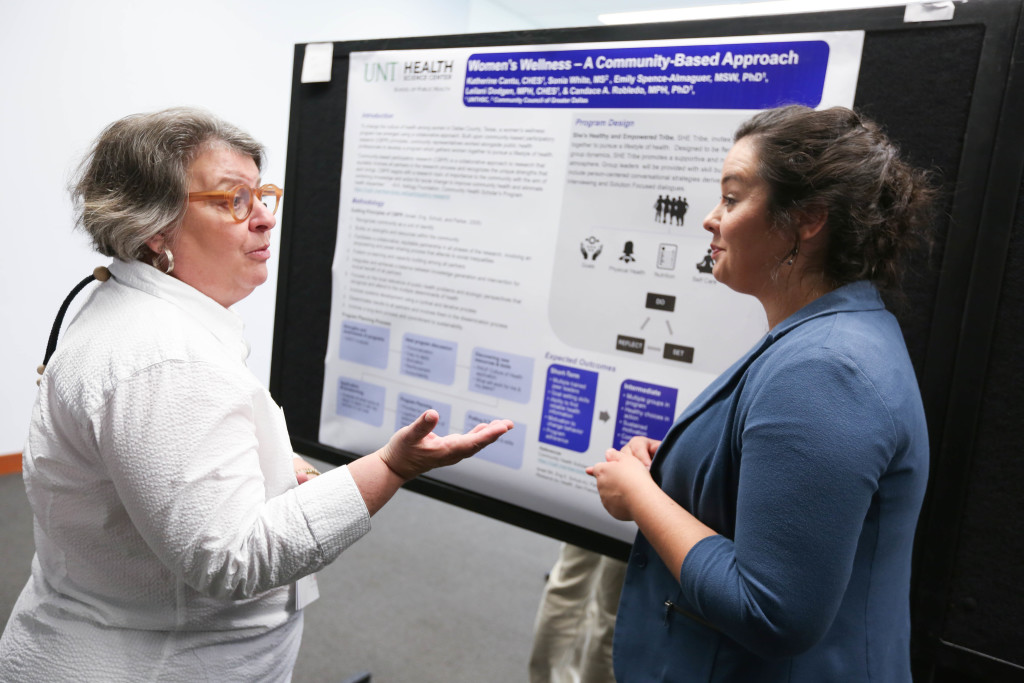MPH Community Health
Request Information /Admission Requirements / Application Deadlines / Apply Now!
Full-time Program: All students entering fall 2016 will progress through their program in a cohort, completing all degree requirements in five semesters (including summer).
The community health concentration prepares students from a variety of undergraduate majors (biology, kinesiology, nutrition, nursing, psychology, anthropology, sociology, education, communication, and others) for public health careers that focus on community change and empowerment. This multidisciplinary approach addresses the behavioral, community, socio-cultural, and economic factors that protect and undermine human health.
The concentration focuses on community engagement and assessment, and community program planning and evaluation. Students will learn to design, implement, and evaluate preventive interventions, and advocate for public policy that seeks to improve community health and reduce health disparities. Students will be prepared to critically appraise findings from community-based research, effectively communicate findings to the public and policy makers, and advocate for evidence-based community health programs and policies. Traditionally, program graduates have assumed positions in public health departments, health and human services agencies, health care settings, and in community-based research projects. Students in community health concentration will complete a minimum of 48 semester credit hours to earn the MPH degree.By the conclusion of the MPH program, a student in community health will be able to:

Samantha Gonzalez, MPH, CPH
Care Manager and Patient Health Educator
Salud Family Health Centers, Estes Park, CO
Comprehend, apply, and evaluate multi-level and interdisciplinary theories and models used to solve community health problems;
Identify and evaluate the relative contribution of ecological determinants to health outcomes among populations, including vulnerable populations and disadvantaged communities;
Understand, select and employ appropriate quantitative and qualitative research methods for testing community health interventions and resolving community health problems;
Plan, implement, administer, and evaluate community-based initiatives and programs using asset-based and data-driven approaches;
Understand, administer, and evaluate community-based participatory approaches for reducing health disparities and improving community health outcomes.
2016-2017 Curriculum (48 SCH)
Core MPH Competencies (see below) / Course Descriptions / Sequence of Coursework
Core Courses: 15 SCH
BACH 5300 Theoretical Foundations of Individual & Community Health (3 SCH)
BIOS 5300 Principles of Biostatistics (3 SCH)
EOHS 5300 Environmental Determinants of Health (3 SCH)
EPID 5300 Principles of Epidemiology (3 SCH)
HMAP 5300 Introduction to Health Management & Policy (3 SCH)
Concentration Required Courses: 19 SCH
EPID 5313 Introduction to Data Management and Statistical Computing (3 SCH)
BACH 5314 Quantitative Research Methods (3 SCH)
BACH 5340 Community Assessment and Program Planning (3 SCH)
BACH 5345 Participatory Approaches to Improving Community Health (3 SCH)
BACH 5350 Community Health Program Evaluation (3 SCH)
BACH 6310 Qualitative Research Methods (3 SCH)
PHED 5197 Professional and Academic Development (1 SCH)
Elective Courses: 6-12 SCH
(12 SCH with comprehensive examination: 6 SCH with Thesis)
Practice Experience: 2 SCH
BACH 5297 Public Health Practice Experience (2 SCH)
Culminating Experience: 0-6 SCH
PHED 5000 Certified in Public Health Examination (0 SCH)
BACH 5001 MPH Comprehensive Examination (0 SCH)
Or
BACH 5395 Thesis
CORE MPH COMPETENCIES
The Master of Public Health degree program prepares students to address the following core competencies while advancing their knowledge of public health:
Public Health Knowledge & Skills-The MPH student will apply basic knowledge and skills of the core public health sciences that include: biostatistics, epidemiology, health management and policy, behavioral and community health, and environmental and occupational health, to the prevention of illness and injury and the promotion of population health.
Integration of Theory and Practice-The MPH student will demonstrate the effective integration of theory and practice related to public health issues that affect diverse populations, through a thesis or comprehensive examination and a practice experience.
Communication and Informatics-The MPH student will gather, organize, and manage data and information effectively to address public health issues through oral and written communications to diverse professionals and lay audiences.
Diversity and Culture-The MPH student will demonstrate the ability to interact with both diverse individuals and communities to produce or impact an intended public health outcome.
Professionalism-The MPH student will apply ethical principles to the practice of public health in a variety of settings, demonstrating personal integrity while embracing diverse communities.



Social media